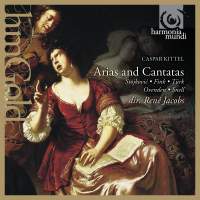Texte paru dans: / Appeared in:
|
|
|
Outil de traduction (Très approximatif) |
|
|
Reviewer: Jonathan Freeman-Attwood
Of all the highways and byways trekked by the durable René Jacobs in the last 30 years, Caspar Kittel is definitely a B road. Yet as a student of the even more durable Schütz, Kittel is entirely and gratifyingly at home with the stylistic melange promoted (both wittingly and unwittingly) by his mentor in the pursuit of an expressive new German 'art' music. Standard idioms of the progressive early-17th century are plain to hear in this riveting selection of Kittel's Arias and Cantatas for 1-4 voices and continuo, dating from a year before the Dresden composer died in 1639 - another gifted musician to reach only 36 years of age. What exactly constitutes an aria as opposed to a cantata is hard to pin down in a period of unregulated genres; though in the case of Kittel the quality ingredients are, consistently, texts that shine brighter - as he glorifies in vocal representation and versatility (distilled from Caccini and other Italians), and concentrated instrumental ritornello scene-setting in the best German manner. There is also that unmistakable Schützian contrapuntal élan of which Kittel is a master.
Kittel's command of setting both frivolous and serious verse is demonstrated here in some works of outstanding merit. 'Coridon, der gieng betrubet' is a piece of considerable emotional refinement, as is the sectional 'Gleich wie zyr Sommerziet'; for all the latter's pastoral attire, this is a profoundly felt elegy on the 'passing away of a noble virgin', endearingly sung by the two sopranos, Johanna Stojković and Bernarda Fink. The verse of contemporary poet Martin Opitz contains the full range of imagery for Kittel to establish his musical credentials, and how exquisitely he casts the strophic narrative 'Mein Lieb, wie schöne bist doch du', paraphrased by Opitz from the sensuous Song of Songs. Stojković reveals the technical challenges, which she negotiates, if not effortlessly, then with enough technical command and strength of character to convey the essence of Kittel's virtuosity: can we believe that such florid lines were merely written to keep the Dresden court choirboys well-oiled ?
The men have their work cut out
too, and each responds with pioneering zeal to Kittel's 'passagi', exemplary in
the opening aria and, as a trio with Fink, in the choleric 'O du Gott'. Extended
beauty is to be found in 'Ietzund kömbt die Nacht', richly coloured by the two
tenors - and by Kittel's discerning chromaticism - and its irresistible gamba
ritornello. This is the golden track on the disc, encompassing the sweetest
expression in a musical language which, more often than not, demands the
prerequisites of knowledge and acceptance of early baroque stylistic parameters.
Certainly, a true discovery for those steeped in the Schütz and Monteverdi
generations. |
|
|
|
|
|
Cliquez l'un ou l'autre
bouton pour découvrir bien d'autres critiques de CD |
|




